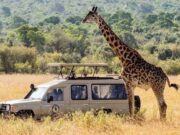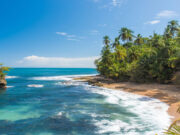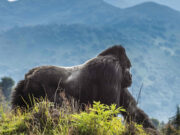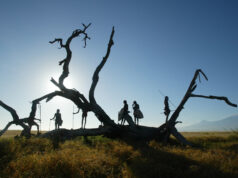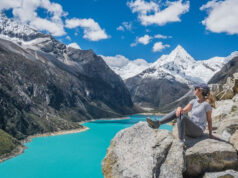
The Galapagos islands have become an increasingly popular destination with over 200,000 visitors walking through designated areas in recent history. But that doesn’t mean that travelers should stay away. Travelers just need to take a little extra time planning their trips and taking certain things into consideration. Although an increasing number of companies are focusing their efforts on sustainable travel in the Galapagos, there are two companies we would like to investigate that have been working together to protect Galapagos wildlife, bolster economic stability to island communities and provide wholesome experiences for travelers: Wildland Adventures and Ecoventura.
In 2000, Ecoventura became one of the first recipients of SmartVoyager, an environmental and social program developed by Corporacion y Desarollo in Ecuador and The Rainforest Alliance in New York. According to Doris Welsh, Ecoventura’s director of sales and marketing, tour boats have to meet a strict set of standards (created by experts in the fields of science, conservation and tourism) designed to promote the conservation of natural ecosystems, fair treatment of workers, community welfare, and the planning and maintaining of sustainable systems. Wildland Adventures also operates under these guidelines and every vessel owned by the company is certified or in the process of becoming certified by SmartVoyager.
By implementing energy efficient technologies on its flagship yachts, Ecoventura was the first operation to reduce its carbon emissions by nearly 100 percent. Wastewater is naturally purified and is discharged a minimum of 12 miles from shore in accordance with the law. When it comes to powering the boats, four stroke engines are used, which consume 50 percent less fuel than two stroke engines. They are also 70 percent quieter and emit almost no fumes. Boats are covered in lead-free paint and exterior walkways are free of varnish. Only biodegradable soaps and detergents are used for cleaning. Recycling receptacles are available on board and waste is sorted and brought to recycling centers on the islands after each trip. Ecoventura has even considered the effect of bug spray and has installed yellow lights on its boats so insects aren’t attracted to the activity. The best part about Ecoventura is that they are just getting started.
Travelers aboard Ecoventura or Wildland Adventures yachts are guaranteed to enjoy fresh meals catered for their dietary needs. In 2009, Ecoventura started using local produce and goods for its onboard meals. Sixty percent of the fresh ingredients onboard are sourced from sustainable farms in the Galapagos. The water on Ecoventura’s yachts is provided through reverse osmosis desalinization units, therefore eliminating the need for plastic water bottles.

After inquiring further, we learned that Ecoventura and Wildland Adventures have been working to hinder illegal fishing operations and other challenges on the islands. “In 2006, Ecoventura helped to establish the Galapagos Marine Biodiversity Fund in partnership with the World Wildlife Fund with a common goal to build local capacity to work towards sustainable development supporting environmental education and marine conservation projects that benefit the marine reserve, with special emphasis on providing scholarships to local young people and fostering their ability to manage natural resources,” said Doris Welsh. One of the projects that came from this fund was a floating surveillance platform called Tiburon Martillo (hammerhead shark). This platform was developed to help rangers patrol the marine reserve around the northern islands, assist with repairs to patrol boats and help make small-scale legal fishing practices more efficient. The marine reserve surrounding the Wolf and Darwin islands supports some of the planet’s most diverse life and is one of the world’s premier diving areas. However, it has also been identified as the most threatened and has seen the highest number of fishing violations. According to Doris, “Hammerhead and other shark species around the world are being harvested primarily for their fins, and the Galapagos Marine Reserve remains one of the last regions where these creatures can be seen gathered by the hundreds.”
When it comes to providing the best tour experience for travelers, both Wildland Adventures and Ecoventura are passionate about employing top notch naturalists from the Galapagos and Ecuador. “There are three levels of naturalists in the Islands,” said Sherry Howland, program director at Wildland Safaris. “The top-most guides are educated in the natural sciences and complete a rigorous training session offered by the National Park. They are also fluent in at least English and often more languages.” All of the guides at Ecoventura are Ecuadorian nationals (65 percent are Galapagos residents and 25 percent are native Galapaguenos). In fact, Ecoventura has the highest percentage of local employees than any other tour company in the area.
When going on island excursions, travelers are asked to stay on the trails and to follow the National Park guidelines. Adhering to these rules help keep everyone safe, including the wildlife. Listening to the canaries as they sing their songs, indulging in local cuisine prepared by a master chef, playing among the waves, learning about the islands, and witnessing marine life thrive below your snorkel are the memories that will entertain as well as calm your nerves for years to come. At least that is what these companies promise.
Knowing that the wildlife will still be there when the next generation grows up is what the people at Ecoventura and Wildland Safaris say they are striving for. We have plans to investigate just how passionate they are and how much of an impact they have on their guests.




